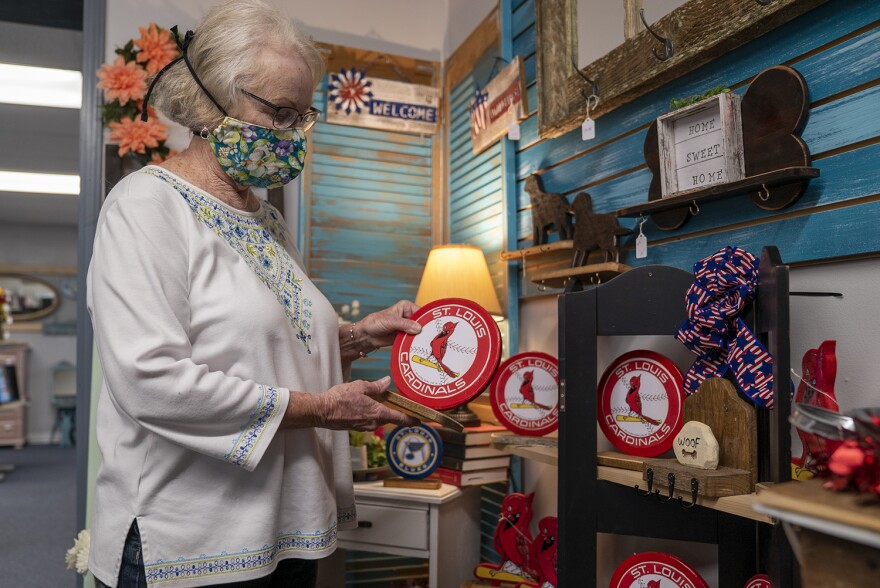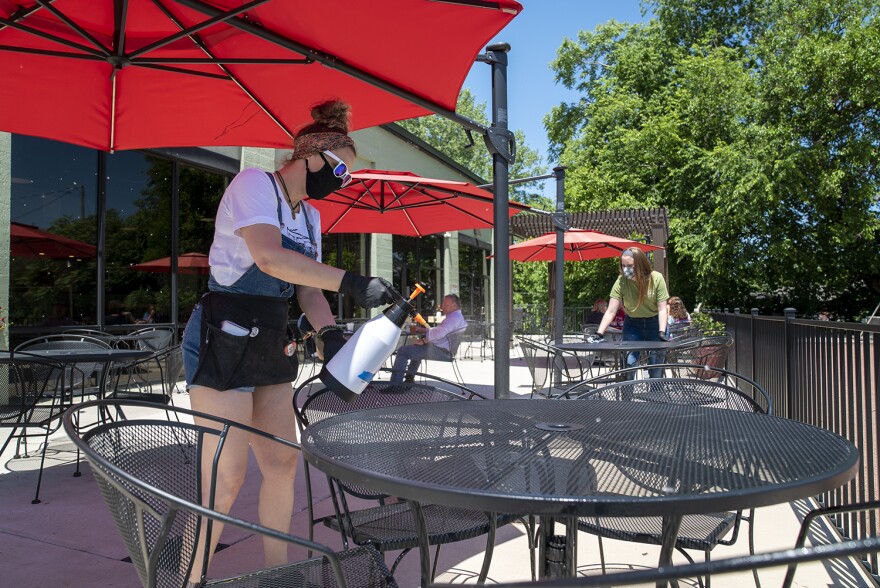Nearly all businesses in Illinois are now able to open more than two months after Gov. J.B. Pritzker’s initial stay-at-home order to slow the spread of the coronavirus.
There are still some restrictions and guidelines on how stores should operate, but they’re no longer closed to the public. Generally the state requires workers wear masks, and maintain a six feet social distance when possible.
The change Friday is much anticipated relief for Metro East businesses, who’ve had to stay closed for nearly two weeks while they watched their counterparts open in Missouri.
“I couldn’t sleep last night. I tossed and turned to make sure I had everything ready. It was just excitement,” said Jill Frieden, one of seven partners who runs Makers Market, a new craft shop in Maryville. “It’s awesome to be able to open our store that we’ve worked so hard to bring to the community.”
Makers Market welcomed customers inside for the first time ever on Friday, where they could browse bath and body products, home decor and other handmade crafts from 30 local vendors. The store is run by seven localcrafters and operates like a co-op where small craft makers can rent out space to sell their products from, Frieden said.
They were planning to open the store in April, but the coronavirus derailed those plans. The partners worried the store wouldn’t be financially viable if the lockdowns extended, Frieden said.

“It means everything for our business that we’re finally able to open the doors,” she said.
Customers said they were ready to start shopping in-person again after weeks of staying home, but were reluctant to speak further.
Restaurants reopen
Some restaurants in the region were also able to resume serving customers in-person Friday. Last week, the state decided restaurants could let customers dine outdoors in this phase of reopening.
“That was a bit of a surprise for us,” said Derik Reiser, owner of the Old Herald Brewery and Distillery in Collinsville. “It was like the best day ever because we had a nice patio space that we can offer.”
Reiser welcomes the change because he had heard of Metro East residents venturing to St. Louis or even St. Charles just to get a dine-in experience again. Just after noon on Friday a few tables were full with the brewery’s first in-person customers since the coronavirus lockdowns started in March.
It’s not full steam ahead back to a pre-pandemic normal for the Old Herald, Reiser said. The brewery will change how it operates to reduce contact between staff and customers.
“We’re emphasizing contactless payments, like Apple Pay, Android Pay, those kinds of things,” he said. “We’ll need to almost train some of those customers on how to do that. It minimizes the exchange of credit cards and cash.”
Serving customers outside allowed Reiser to bring back most of his staff. Lauren Howell, a waitress at the brewery, said she was elated to be back at work.
“This is the first glimmer of hope of a regular life that we’re seeing,” she said. “I just want my tables back. I want normalcy again.”
That will take some time, Howell admitted while wearing a mask and gloves, just some of the precautions the restaurant is taking. It will also sanitize every table after each meal and use compostable plates and flatware.
“The sanitization and protection is perfectly warranted,” Howell said. “It’s annoying but we’re going to keep our customers and us safe as the first priority.”

For now, the restaurant will only be able to serve 60 people safely on its patio, and it's using online reservations to manage how many customers are on the property at one time, Reiser said.
“We’ve had our regulars texting us if they can get a reservation in even before we had our reservation system set up,” Reiser said. “People are ready to get out of this suppressed routine and get back to the places that they enjoy. That’s exciting for us.”
Some businesses will be slower to return to their pre-pandemic operations. Mark Cartier, who co-owns Rich’s Record Emporium in Collinsville, doesn’t expect the store will be ready to serve customers until June 3.
“We used to have employees, now we don’t,” he said. “Without employee coverage, the owners can only get here certain days a week.”
And even when the shop does open, he said he will be cautious because he’s at risk of infection and so is his wife, a cancer survivor. The risk of COVID-19 is not something any of the shop owners want to take, Cartier said.
“We were all just hobbyists that were semi-retired that had nothing else to do,” he said. “So the whole idea was to have a shop that was something fun to do in our retirement years. No one ever dreamed that this would happen.”
Unprepared for reopening
Moving to reopen businesses now puts disadvantaged communities at more risk of the coronavirus, said Wyvetta Granger, executive director of Community Life Line, which distributes physical and financial resources across St. Clair and Madison counties, but mostly East St. Louis and the surrounding communities.
“We’re requiring that people wear masks, we’re requiring that people wear all of these different protective measures,” she said. “We haven’t done anything to ensure the community has access to them.”
Granger would have liked to see some intermediate opening stage where people in her community could stock up on protective equipment. She added there hasn’t been enough education around the coronavirus and to protect against it.
Reopening more stores and businesses in the region will likely lead to more cases in and around East St. Louis because of other misconceptions and stigma around the virus, Granger said.
“People who have come out and recovered — some were shamed,” she said. “Some are avoiding getting tested.”
Granger added most people in and around East St. Louis don’t have a safe place to quarantine if they test positive for the coronavirus, something she expects as more movement and economic activity resumes in the region.
“This disease has no borders. It’s viral,” she said. “At any point, any person can be infected and you can run the risk of infecting someone else.”
Eric Schmid covers the Metro East for St. Louis Public Radio as part of the journalism grant program: Report for America, an initiative of The GroundTruth Project. Follow Eric on Twitter: @EricDSchmid
Send questions and comments about this article to: feedback@stlpublicradio.org





